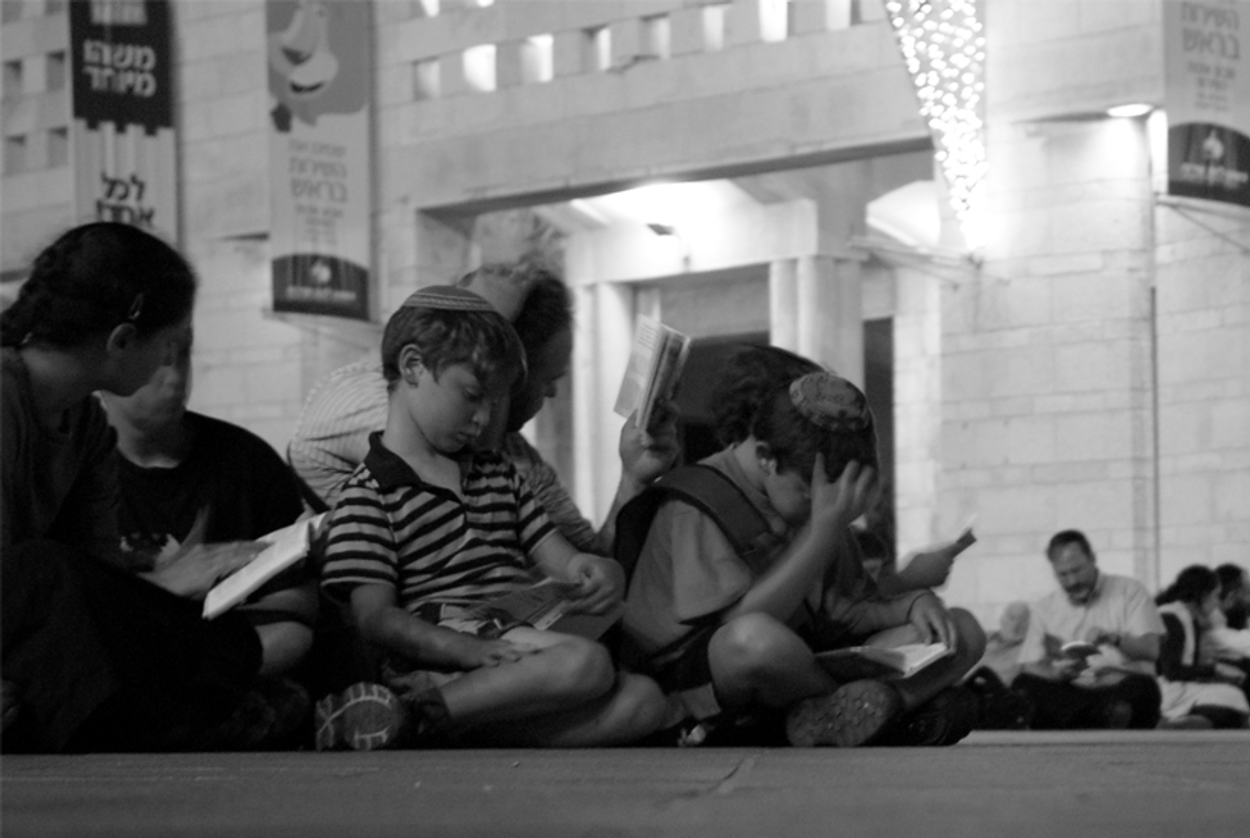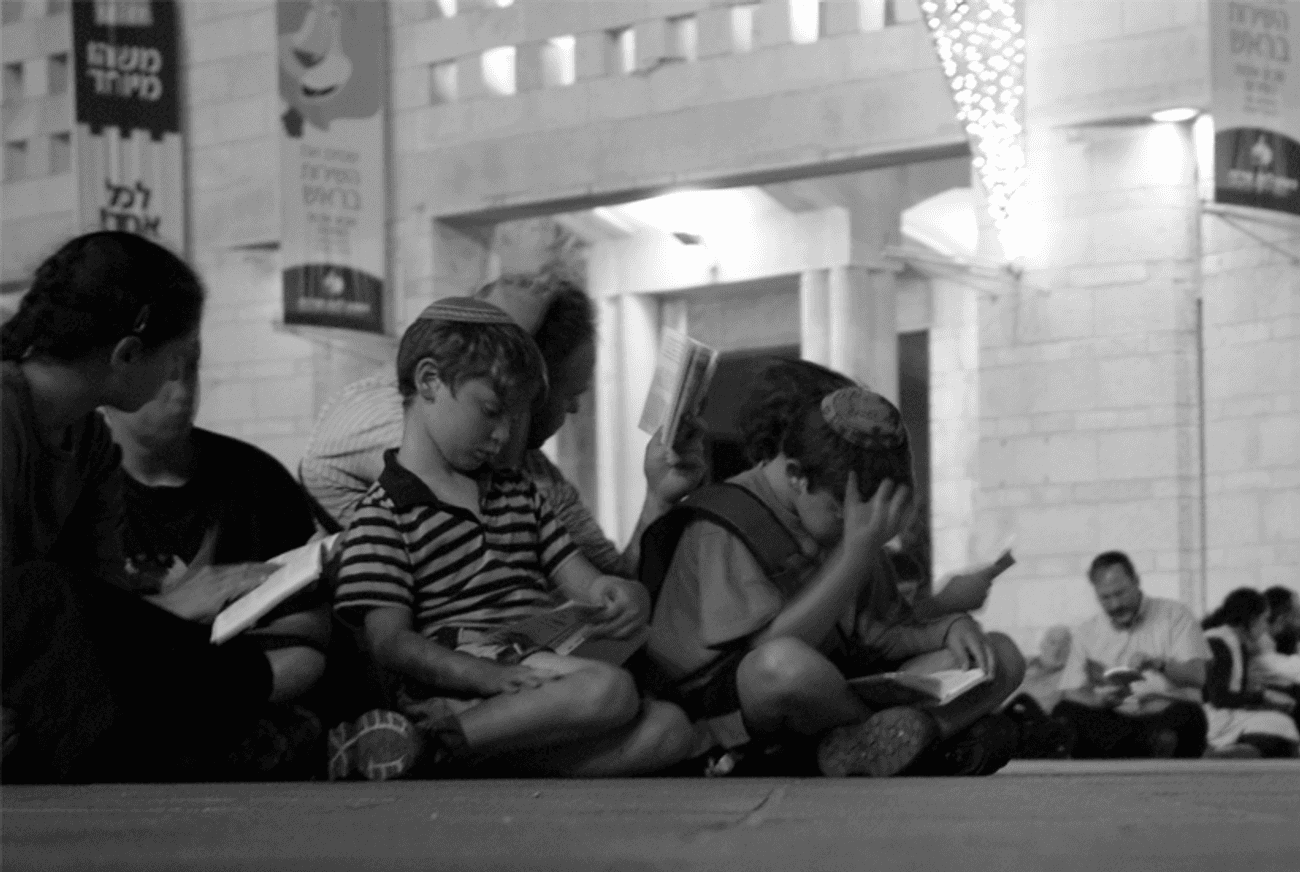People Who Secretly Love Feeling Miserable on Tisha B’Av
The holiday gives us permission to mourn for many things, personal and communal, that we avoid discussing the rest of the year




My first memory of Tisha B’Av was when I was around 6 years old. My siblings were happily ensconced in front of the television watching cartoons, but because I was the oldest boy, my father told me that I was too old for that and needed to come to shul with him.
My father had explained Tisha B’Av to me quite thoroughly: We were mourning the destruction of not one but two temples. Still, at 6, the holiday was difficult to grasp. What is a temple to a child? What is mourning to a child? I stayed at shul only a little while before I got thirsty; I ran home to drink some orange juice, and my mother caught me. Even though she had her own problems with fasting in general (nausea, vomiting) and Tisha B’Av in particular (moping around the house in canvas shoes as if she’d been sentenced to house arrest), she told me that my father would be very disappointed in me. Even though at 6, I wasn’t expected to fast, I was supposed to make it through the evening at least without drinking.
And that’s how I was introduced to the holiday: breaking rules, disappointing my parents, and feeling guilty.
Surely I wasn’t the only Jewish child to be flummoxed by Tisha B’Av. What exactly were we to do with a grief-filled holiday that fell in the middle of a joyous American summer? Especially a holiday that most American Jews in the 1970s had never heard of—except perhaps as a laugh line in Allan Sherman’s song “My Zelda”: Why did she go and fall in love /I haven’t seen her since last Tisha B’Av.
My mother was probably the quietest woman in Queens, not one to talk about her ideas or feelings—her deepest beliefs transmitted to me only by whisper. Although this would be hard for the casual acquaintance to see, much of the year my mother lived beneath a layer of stifled dread and nervous undefined guilt, but on Tisha B’Av she would move about the house like a struck child filled with fear, foreboding, and grief. Year after year, the holiday filled my mother—and, by extension, me—with a thick dread and engulfed us for weeks prior and after.
When I was 7, my family went on a summer trip to Israel. On the evening of Tisha B’Av we went to the Wailing Wall, as many tourists do. There among the throngs I wandered off and got lost. Even though I was 7, I was quite self-possessed: I wrangled a ride back to my hotel with some pretty female soldiers in an open troop truck. One of them kissed me goodbye (I am not sure that was allowed on Tisha B’Av), and a male soldier let me pick up his rifle for an instant. Within a short time, my mother appeared, breathless, and hustled me up to the room, where she broke into uncontrolled weeping that continued for a long time. “What’s the matter with Ma?” I asked my father, who seemed totally unfazed by my getting lost. He gave a shrug.
When I got just a little bit older, I asked my mother about her outsized reaction. “I was afraid I lost you,” was all she would say. But over time I came to understand more as I put some things together from bits and pieces she told me about her childhood: She was born in London just before WWII. When bombs started to fall in 1940, she was 4 years old. In a misguided policy designed by the otherwise famously competent child psychoanalysts Anna Freud and D.W. Winnicott, children were forcibly evacuated from London to the countryside—without their mothers. My mother was put with her older sister on a train to Leeds, where they stood in a village square waiting to be “picked” by the townspeople. From then on, for the rest of her lifetime, she could brook no separations. The whole family had to stay in constant contact with her, even when we had absolutely nothing to say. There was an implicit but powerful promise unconsciously extracted from us: We will never separate from you.
As the Tisha B’Av story came down to me from my father and from books, I was taught that the Jews did bad things to God and to each other and were punished with exile. This story line mirrored my mother’s understanding of what happened to her as a child: She was “bad” and therefore she was punished with exile and separation. The communal, historical tale of the holiday became enmeshed with her own personal, much more recent trauma.
In an effort to prevent her further suffering, I vowed to fulfill my grieving quota on Tisha B’Av from that point forward: fasting, sitting on the floor and studying with my father the Talmud portion (Gitten 56a) of Kamza and Bar Kamza—two men whose mean-spirited small-mindedness caused the destruction of Jerusalem. Perhaps if I did this, I thought, we would all be spared future grief and that terrible things would no longer happen.
As I matured, I took notice of the other adults around me and I made a startling discovery: There were people who seemed secretly to love Tisha B’Av. I noticed that some people, though they may have tried to hide it, were really into all the grief and lamentation.
At first I was shocked. Who would want to cry and feel “bad”? And yet, I saw people for whom the day was a partial catharsis, a chance to grieve without guilt. One man I remember, a neighbor down the block, wore what I called his “Tisha B’Av face” the whole year long, though he tried to hide it the rest of the year. In one shul, men took turns reading Eicha on the floor. Many were survivors. One man, with multiple bereavements from the war (a first wife and children killed in the camps) hogged the lion’s share of the Lamentations reading. Tisha B’Av, the day of grief and sorrow, seemed for them a vindication of their suspicion that the Jewish people were perversely favored by God, singled out—for punishment. These men saw history as a never-ending cycle of sin, punishment, and intimacy that the Jewish people alone had with God, and that one day, after we had endured enough suffering, we would be redeemed. In fact, some of the men in my shul seemed to revel in the heartsickness of the day. For them it was a grief holiday embraced with a certain perverse zeal.
And those who didn’t carry personal grief on their backs had a communal grief they were almost happy to share. There were the men in shul who would gladly recount all of the sufferings of the Jewish people. Did you know that WWI started on Tisha B’Av? The expulsion of the Jews from Spain in 1492? How about when Jews were expelled from England in 1290? From France in France in 1306? Yup. They were all on the 9th of Av. But wait, there’s more: The Nazi beast Heinrich Himmler received approval for the order of the Final Solution on Aug. 2, 1941; that, too, was on the 9th of Av, as was the order for mass deportations from the Warsaw Ghetto in 1942.
To us, the younger generation, all of that was “history.” This was Queens in the 1970s, not Warsaw in the 1940s. We were in an air-conditioned synagogue, and Lamentations was read in soft, sweet, aching tones. It was hard for me and the other young people to feel any of the “appropriate” feelings on Tisha B’Av. Nevertheless, I caught the drift that the older congregants were desperate to be close to feelings or ideas that were important to them. Throughout the year they felt stymied, perhaps, but less so on Tisha B’Av. At the time, when I was young, I looked down on them as insincere grief opportunists. They wanted to cry and they were searching for any opportunity. Like Tommy Wilhelm at the end of Saul Bellow’s Seize the Day, they could crash a stranger’s funeral and cry there in the pews with the mourners.
But maybe that’s the point of Tisha B’Av—as well as other Jewish holidays. They’re not just times to commemorate what we are “supposed” to commemorate, but days for people to express highly personal emotions that they feel duty-bound to suppress the rest of the year. They keep quiet most days out of embarrassment or to protect their families or just to be on “good behavior” in the eyes of the community.
This hit home for me when I was much older and a friend described to me a visit with his grandmother, who was in her nineties at the time. He asked her for stories of her childhood in the Old Country. She would draw a blank. My friend was frustrated, but he came up with an idea: He would ask her for stories not of herself but of the Jewish holidays, and then the stories began to flow. On Rosh Hashanah I did this, on Sukkos we did such-and-such. On Tisha B’Av the rabbi came to the synagogue and sat down on the floor and wailed and we cried with him. Listening to my friend, I understood that the holidays gave his grandmother “permission” to express some aspect of herself. Here was an old woman whose sense of self was deeply entwined with Jewish culture and religion. Only when the holidays were spoken of could her “self,” bound as it was with the sacralized memories of those holidays, come forth.
Nowadays I spend a good part of Tisha B’Av in shul as I always have, but I am less circumscribed by the day’s “appropriate” feelings and more comfortable with my own ideas. One of them is that human beings are full actors, even in the confined spaces of shul and home. There are infinite ways we have to grieve, to be sad, to examine our feelings, even to take a lighter look at our sadness when we can.
By way of this, the Talmud records a story that has become famous. It happened that Rabban Gamliel, Rabbi Elazar ben Azaria, Rabbi Joshua, and Rabbi Akiva went up to Jerusalem. When they reached the (destroyed) Temple Mount, they saw a fox emerging from the place of the Holy of Holies. The others started weeping but Rabbi Akiva laughed.
“Why are you laughing?” they asked him.
He answered: “It was prophesied that foxes would haunt the Temple Mount. It was also prophesied that ‘old men and women shall yet dwell in the streets of Jerusalem.’ Now that the first has happened, we know that the second, the redemption, will happen, too. This is why I laugh.”
It is possible that Rabbi Akiva, in addition to instructing us on prophecy, might also have been expressing the tension between grief and mirth. Perhaps he was saying, too, that the “life-giving pleasures of grief” may also carry the seeds of consolation.
It is no wonder the other rabbis responded: “Akiva, you have consoled us. Akiva, you have consoled us!”
Alter Yisrael Shimon Feuerman, a psychotherapist in New Jersey, is director of The New Center for Advanced Psychotherapy Studies. He is also author of the Yiddish novel Yankel and Leah.